药学英语电子教案unit 4-4-2 Indications
- 格式:ppt
- 大小:180.00 KB
- 文档页数:5
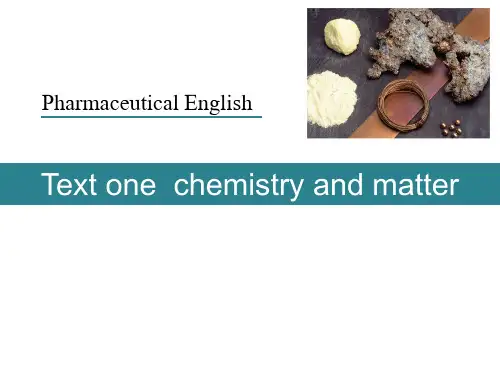
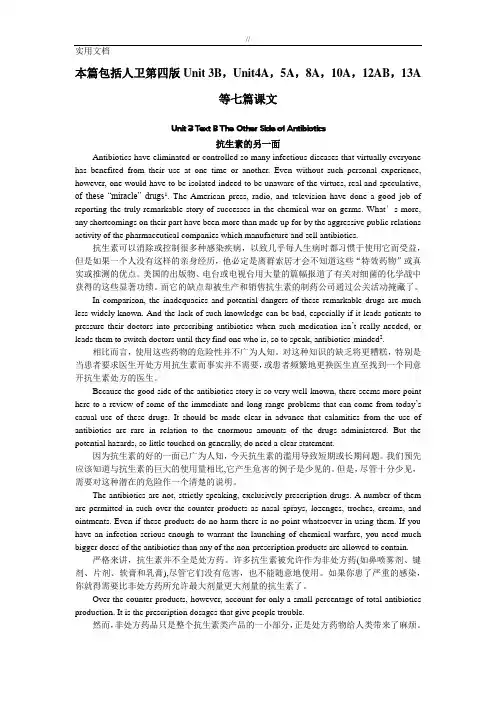
本篇包括人卫第四版Unit 3B,Unit4A,5A,8A,10A,12AB,13A等七篇课文Unit 3 Text B The Other Side of Antibiotics抗生素的另一面Antibiotics have eliminated or controlled so many infectious diseases that virtually everyone has benefited from their use at one time or another. Even without such personal experience, however, one would have to be isolated indeed to be unaware of the virtues, real and speculative, of these “miracle” drugs1. The American press, radio, and television have done a good job of reporting the truly remarkable story of successes in the chemical war on germs. What′s more, any shortcomings on their part have been more than made up for by the aggressive public relations activity of the pharmaceutical companies which manufacture and sell antibiotics.抗生素可以消除或控制很多种感染疾病,以致几乎每人生病时都习惯于使用它而受益,但是如果一个人没有这样的亲身经历,他必定是离群索居才会不知道这些“特效药物”或真实或推测的优点。
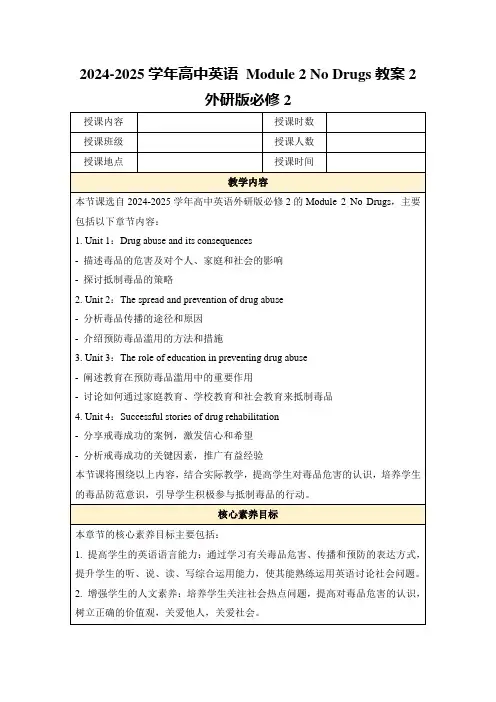
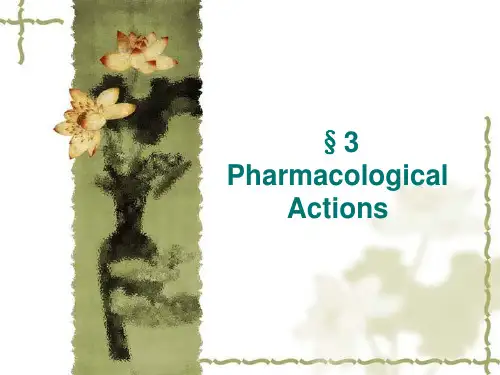
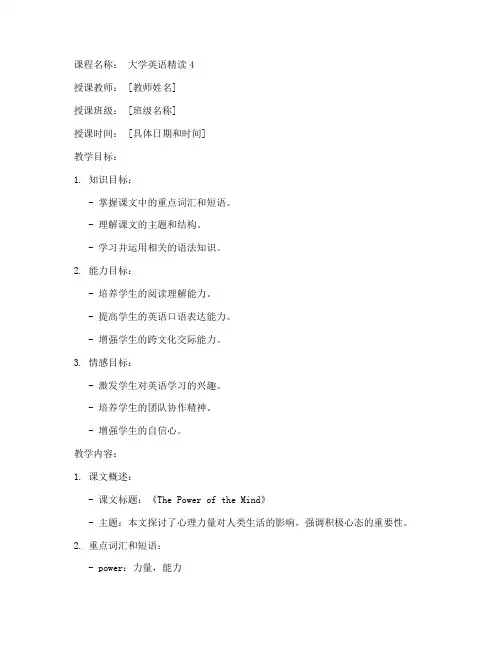
课程名称:大学英语精读4授课教师: [教师姓名]授课班级: [班级名称]授课时间: [具体日期和时间]教学目标:1. 知识目标:- 掌握课文中的重点词汇和短语。
- 理解课文的主题和结构。
- 学习并运用相关的语法知识。
2. 能力目标:- 培养学生的阅读理解能力。
- 提高学生的英语口语表达能力。
- 增强学生的跨文化交际能力。
3. 情感目标:- 激发学生对英语学习的兴趣。
- 培养学生的团队协作精神。
- 增强学生的自信心。
教学内容:1. 课文概述:- 课文标题:《The Power of the Mind》- 主题:本文探讨了心理力量对人类生活的影响,强调积极心态的重要性。
2. 重点词汇和短语:- power:力量,能力- mindset:心态,思维方式- empower:赋予力量- positive:积极的- negative:消极的- attitude:态度- challenge:挑战- overcome:克服3. 语法知识:- 现在完成时- 过去进行时教学过程:一、导入(5分钟)1. 利用多媒体展示与课文主题相关的图片或视频,激发学生的兴趣。
2. 提问:什么是心理力量?心理力量对我们的生活有什么影响?二、课文阅读(15分钟)1. 学生自读课文,完成课后练习题。
2. 教师引导学生讨论课文内容,回答以下问题:- 课文的主要观点是什么?- 文章中列举了哪些例子来支持作者的观点?- 你认为积极心态对我们的生活有什么意义?三、词汇讲解(10分钟)1. 教师讲解重点词汇和短语,并进行例句分析。
2. 学生练习使用重点词汇和短语进行造句。
四、语法讲解(10分钟)1. 教师讲解现在完成时和过去进行时的用法,并进行例句分析。
2. 学生练习使用所学的语法知识进行句子改写。
五、课堂活动(10分钟)1. 分组讨论:结合自己的经历,谈谈积极心态对个人成长的影响。
2. 小组代表分享讨论成果。
六、总结(5分钟)1. 教师总结本节课的重点内容。
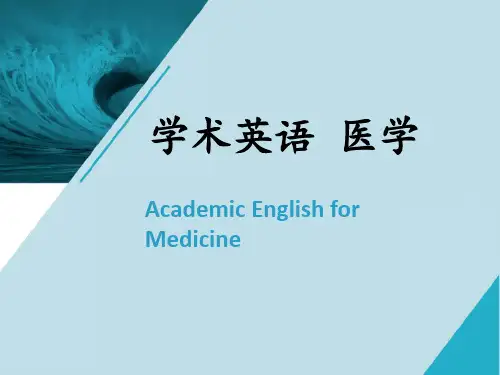
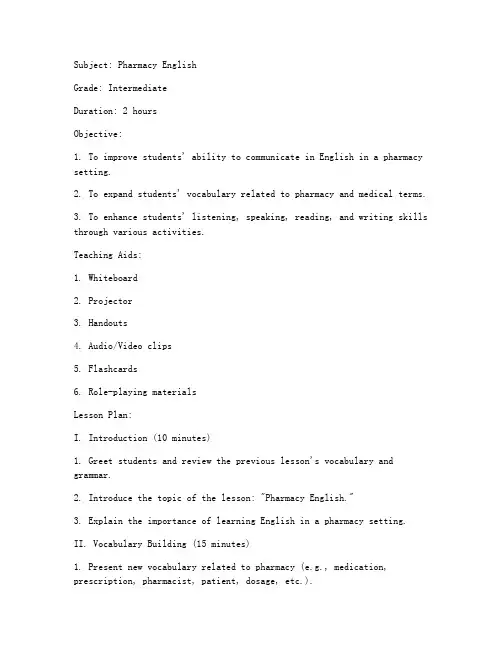
Subject: Pharmacy EnglishGrade: IntermediateDuration: 2 hoursObjective:1. To improve students' ability to communicate in English in a pharmacy setting.2. To expand students' vocabulary related to pharmacy and medical terms.3. To enhance students' listening, speaking, reading, and writing skills through various activities.Teaching Aids:1. Whiteboard2. Projector3. Handouts4. Audio/Video clips5. Flashcards6. Role-playing materialsLesson Plan:I. Introduction (10 minutes)1. Greet students and review the previous lesson's vocabulary and grammar.2. Introduce the topic of the lesson: "Pharmacy English."3. Explain the importance of learning English in a pharmacy setting.II. Vocabulary Building (15 minutes)1. Present new vocabulary related to pharmacy (e.g., medication, prescription, pharmacist, patient, dosage, etc.).2. Use flashcards to display the vocabulary and have students repeat after you.3. Provide a brief explanation of each word and its usage in a pharmacy context.III. Listening Exercise (15 minutes)1. Play a short audio clip about a conversation between a pharmacist anda patient.2. Pause the clip at certain points and ask students to predict what the next part of the conversation might be.3. After listening to the entire clip, discuss the main points and vocabulary used.IV. Reading Exercise (15 minutes)1. Distribute handouts containing a short passage about common pharmacy procedures or medication instructions.2. Have students read the passage silently and then discuss the main ideas with a partner.3. Ask students to summarize the passage in their own words.V. Speaking Activity (20 minutes)1. Divide the class into small groups of four.2. Provide each group with a role-playing scenario involving a pharmacist and a patient.3. Have students prepare for their roles by reviewing the vocabulary and scenario details.4. Conduct the role-plays in front of the class, and then discuss the outcomes with the entire group.VI. Writing Exercise (15 minutes)1. Hand out a writing prompt related to a common situation in a pharmacy(e.g., a patient asking for advice on a medication).2. Give students 10 minutes to write a short paragraph or dialogue in English, addressing the prompt.3. Collect the writings and provide feedback on grammar, vocabulary, and coherence.VII. Review and Homework (10 minutes)1. Review the main points of the lesson, including vocabulary and grammar.2. Assign homework: students should write a short paragraph in English describing a typical day in a pharmacy, incorporating new vocabulary and grammar from the lesson.VIII. Closure (5 minutes)1. Summarize the lesson and encourage students to practice their English outside of class.2. Thank students for their participation and ask if there are any questions or concerns.Assessment:- Participation in class activities- Correct use of vocabulary and grammar- Completion and quality of homework assignments- Improvement in communication skills in a pharmacy setting。

本篇包括人卫第四版Unit 3B,Unit4A,5A,8A,10A,12AB,13A等七篇课文Unit 3 Text B The Other Side of Antibiotics抗生素的另一面Antibiotics have eliminated or controlled so many infectious diseases that virtually everyone has benefited from their use at one time or another. Even without such personal experience, however, one would have to be isolated indeed to be unaware of the virtues, real and speculative, of these “miracle” drugs1. The American press, radio, and television have done a good job of reporting the truly remarkable story of successes in the chemical war on germs. What′s more, any shortcomings on their part have been more than made up for by the aggressive public relations activity of the pharmaceutical companies which manufacture and sell antibiotics.抗生素可以消除或控制很多种感染疾病,以致几乎每人生病时都习惯于使用它而受益,但是如果一个人没有这样的亲身经历,他必定是离群索居才会不知道这些“特效药物”或真实或推测的优点。
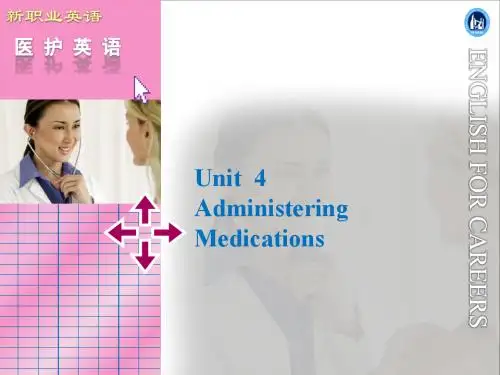
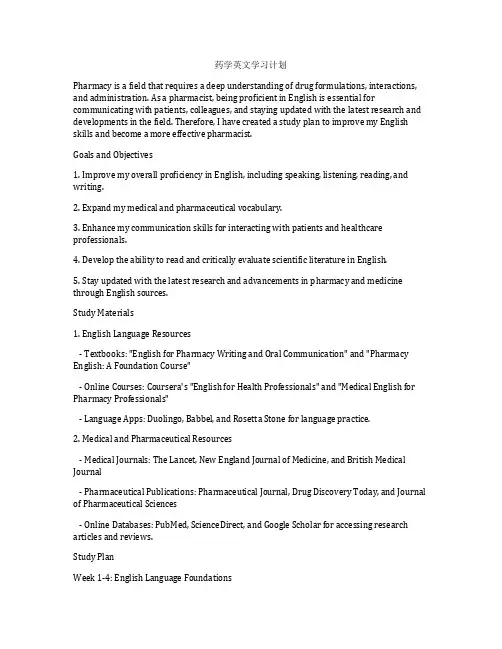
药学英文学习计划Pharmacy is a field that requires a deep understanding of drug formulations, interactions, and administration. As a pharmacist, being proficient in English is essential for communicating with patients, colleagues, and staying updated with the latest research and developments in the field. Therefore, I have created a study plan to improve my English skills and become a more effective pharmacist.Goals and Objectives1. Improve my overall proficiency in English, including speaking, listening, reading, and writing.2. Expand my medical and pharmaceutical vocabulary.3. Enhance my communication skills for interacting with patients and healthcare professionals.4. Develop the ability to read and critically evaluate scientific literature in English.5. Stay updated with the latest research and advancements in pharmacy and medicine through English sources.Study Materials1. English Language Resources- Textbooks: "English for Pharmacy Writing and Oral Communication" and "Pharmacy English: A Foundation Course"- Online Courses: Coursera's "English for Health Professionals" and "Medical English for Pharmacy Professionals"- Language Apps: Duolingo, Babbel, and Rosetta Stone for language practice.2. Medical and Pharmaceutical Resources- Medical Journals: The Lancet, New England Journal of Medicine, and British Medical Journal- Pharmaceutical Publications: Pharmaceutical Journal, Drug Discovery Today, and Journal of Pharmaceutical Sciences- Online Databases: PubMed, ScienceDirect, and Google Scholar for accessing research articles and reviews.Study PlanWeek 1-4: English Language Foundations- Focus on building solid foundations in English grammar, vocabulary, and pronunciation. - Complete the "English for Pharmacy Writing and Oral Communication" textbook.- Practice speaking and listening skills through language apps and online courses.- Set a goal to learn 20 new medical terms and abbreviations each week.Week 5-8: Medical and Pharmaceutical Vocabulary- Learn drug names, classes, and indications through flashcards and online quizzes.- Review pharmaceutical terminology on different dosage forms, administration routes, and drug interactions.- Use medical dictionaries and glossaries to expand my vocabulary on medical conditions, treatments, and procedures.Week 9-12: Communication Skills- Role-play patient counseling scenarios and practice effective communication techniques. - Participate in language exchange programs to improve conversational skills.- Listen to healthcare podcasts and watch medical documentaries to enhance understanding of medical discussions and dialogues.Week 13-16: Reading and Writing Proficiency- Read scientific articles and reviews on pharmaceutical research topics.- Write essays and summaries on medical research papers to improve academic writing skills.- Join online book clubs or discussion groups focused on medical literature and pharmacy-related topics.Week 17-20: Scientific Literature Review- Analyze and critically evaluate scientific literature in pharmacy and medicine.- Learn to identify credible sources and interpret research findings.- Stay updated with the latest trends and advancements in the pharmaceutical industry through reputable medical journals and publications.Week 21-24: Continuous Improvement- Monitor progress and identify areas for improvement in language skills.- Engage in regular practice through language apps, online courses, and real-life interactions.- Set a goal to continue learning 10 new medical terms and expressions each week.Review and AssessmentAt the end of the study period, I will assess my progress by:- Taking language proficiency tests, such as TOEFL or IELTS- Monitoring my ability to communicate effectively with patients and colleagues- Evaluating my comprehension and analysis of scientific literature in EnglishAdjustments to the Study PlanAs I progress, I will reassess my goals and make adjustments to the study plan based on my strengths and weaknesses. I will seek feedback from language tutors, peers, and healthcare professionals to continuously improve my English skills in the context of pharmacy practice.ConclusionImproving my English language proficiency will not only enhance my communication skills as a pharmacist but also allow me to stay updated with the latest research and developments in the field. By following this study plan, I am confident that I will become a more effective pharmacist with the ability to contribute to the healthcare industry in a global context.。

药学英语教学大纲Pharmaceutical English Teaching OutlineIntroduction:Pharmaceutical English teaching is an essential component of the curriculum in pharmacy education. It aims to equip pharmacy students with the necessary language skills to communicate effectively in English-speaking healthcare settings. This teaching outline provides a comprehensive framework for the design and delivery of pharmaceutical English courses.I. Course ObjectivesA. Develop oral communication skills:1. Enhance spoken English proficiency in pharmacy-specific contexts.2. Improve pronunciation and intonation for clear communication with patients and healthcare professionals.3. Build confidence in participating in group discussions, presentations, and role-plays.B. Enhance listening skills:1. Understand spoken English in various pharmacy-related situations.2. Improve the ability to follow instructions accurately and respond appropriately.3. Develop listening strategies for effective communication in pharmacy practice settings.C. Foster reading comprehension skills:1. Increase reading speed and accuracy of technical pharmaceutical texts.2. Enhance vocabulary and understanding of pharmaceutical terminology.3. Develop critical thinking skills through analyzing and interpreting complex texts.D. Improve writing skills:1. Enhance written English proficiency in pharmacy-specific formats(e.g., patient counseling leaflets, drug monographs).2. Develop skills in writing professional and research documents (e.g., reports, research papers).3. Foster the ability to convey information clearly and concisely in written form.II. Course StructureA. Introductory Phase:1. Needs analysis to assess students' language proficiency and identify specific learning objectives.2. Introduce the course syllabus, assessment methods, and expectations.3. Familiarize students with relevant resources and materials for self-study.B. Core Components:1. Oral Communication:a. Role-plays simulating typical pharmacy scenarios (e.g., patient-counselor interactions, pharmacist-physician consultations).b. Group discussions on pharmaceutical topics, promoting active participation and collaborative learning.c. Pronunciation exercises and drills to improve clarity and intelligibility.2. Listening Comprehension:a. Authentic audio materials, including patient consultations, medical conferences, and drug information sessions.b. Guided listening activities with comprehension questions and follow-up discussions.c. Note-taking exercises to develop effective listening strategies.3. Reading Comprehension:a. Pharmaceutical journal articles, research papers, and drug-related case studies.b. Vocabulary-building activities, such as word roots, prefixes, and suffixes.c. Reading comprehension tasks with critical thinking exercises.4. Writing Skills:a. Guided writing tasks, such as patient counseling leaflets, drug profiles, and research summaries.b. Peer editing and feedback sessions to improve writing fluency and accuracy.c. Practice in writing formal emails, reports, and professional correspondence.C. Assessment:1. Regular quizzes and tests to evaluate students' progress and understanding of course content.2. Oral presentations and role-plays to assess oral communication skills.3. Written assignments and research papers to evaluate writing proficiency.4. Final examination covering all aspects of the course.D. Resources:1. Textbooks and reference materials focused on pharmaceutical English.2. Online resources, including academic journals, professional websites, and listening comprehension exercises.3. Language learning software and multimedia tools for self-study.III. ConclusionThe Pharmaceutical English Teaching Outline provides a comprehensive framework for designing and delivering effective English language courses for pharmacy students. By focusing on the development of oral communication, listening, reading, and writing skills, students will be better equipped to succeed in English-speaking healthcare settings. The outlined course structure and assessment methods ensure a well-rounded learning experience, preparing future pharmacists for global professional opportunities.Note: This text is a sample response to the requested article. The content and format can be adjusted according to specific requirements and preferences.。
药学英语教学大纲《药学英语》课程教学大纲课程编号:10042170课程名称:专业英语/The specality english。
学时:36 学分: 2学分适用专业:药学开课学期:第5学期开课部门: 先修课程:英语、药理学、药物化学、药物分析、生物化学等课程后进行本课程教学。
考核要求:以课堂面授和教学实验相结合的方式进行教学,考核形式为开卷考试,其中笔试占80%,平时成绩20%。
使用教材及主要参考书:胡廷熹主编,药学英语,第二版,下册,人民卫生出版社。
美国药典委员会主编,美国药典,第29版,2005年。
英国药典委员会主编,英国药典,2005年。
欧洲药典委员会主编,欧洲药典, 2005年。
一、课程的性质和任务药学英语是药学专业学生所必修的专业课。
药学英语在于培养学生阅读英语专业材料的能力并掌握必要的词汇,为专业内容语言交流打下坚实基础。
二、教学目的与要求根据药学专业本科生培养目标和学习特点,讲授药学英语专业词汇及各类型专业文章,专业文献标题和文摘的翻译与撰写,使学生具备一定英文阅读、写作能力。
三、学时分配(总学时为36)章节教学内容学时数1 总论 22 药物化学词汇及专业文章 43 药剂学词汇及专业文章 44 药理学词汇及专业文章 45 药物分析词汇及专业文章 46 生物化学词汇及专业文章 47 药品说明书,总论, 48 英文药品说明书实例 29 中文药品说明书译英 210 英美药典的选读 211 专业文献标题和文摘的翻译与撰写 212 合计 36 四、教学中应注意的问题老师应注意衣着整齐、仪表端庄;讲课用标准普通话,缓慢,清晰、明了;课前预习,准备充分,并维持好课堂持续;需要多媒体的教学,准备要齐全等。
五、教学内容第一章总论1.基本内容药学英语的重要意义;常用药学英语专业词汇。
2.教学的基本要求通过本章的学习了解药学英语学习的重要意义,总结药学英语常用词汇。
3.教学重点难点重点用药学英语词汇。
教学大纲__药学英语《药学英语》教学大纲Teaching Outline of Pharmaceutical English第一部分大纲说明课程代码:A0905开课时间:第一学期总学时数:60开课部门:交叉科学研究院授课对象:2017级研究生(科学学位硕士生、专业学位硕士生、博士生)考核方式:开卷考试70%,平时成绩30%预修课程:无主讲教师:杨莉教学参考资料:1. 史志祥. 《药学英语(上、下册)》. 人民卫生出版社. 2016年版2. 胡廷熹. 《药学应用英语大全》. 化学工业出版社. 2013年版第二部分教学内容和教学要求《药学英语》旨在帮助药学以及中医药学相关专业的研究生提高科技论文阅读、翻译以及写作能力,结合药学及相关专业学生毕业后的工作实际需求,通过教学中药学以及相关二级的专业英语知识和技能,全面提升我校研究生的专业英语水平,培养适应时代需求的中药复合型研究人才。
课程主要学习中药学学科各相关二级学科(包括中药化学,中药药剂,中药药理,中药鉴定与分析,中药生物技术,中药临床药学)的英语表述与互译,使学生掌握药学专业的专业词汇、术语、短语及句型等,具有良好的专业英语表述和英汉互译能力,为其今后阅读学科前沿文献,会议交流、撰写发表实验科技论文以及国际交流奠定基础,对药学专业研究生科研工作具有重要指导作用。
第一章药学英语总论1.主要内容1.1 药学英语的基本词汇、语法、句型1.2 科技论文、会议摘要、墙报、报告等撰写规范1.3 英文个人简历、项目申请书等撰写规范2.教学要求掌握药学英语的基本词汇、语法、句型;熟悉科技论文、会议摘要、墙报、报告等的撰写规范;了解英文个人简历、项目申请书等的撰写规范。
第二章中药化学英语词汇及专业文章1.主要内容1.1中药化学的基本词汇、语法、句型1.2中药化学专业文章的阅读与撰写规范2.教学要求掌握中药化学的基本词汇、语法、句型;熟悉中药化学专业文章的阅读与撰写规范。